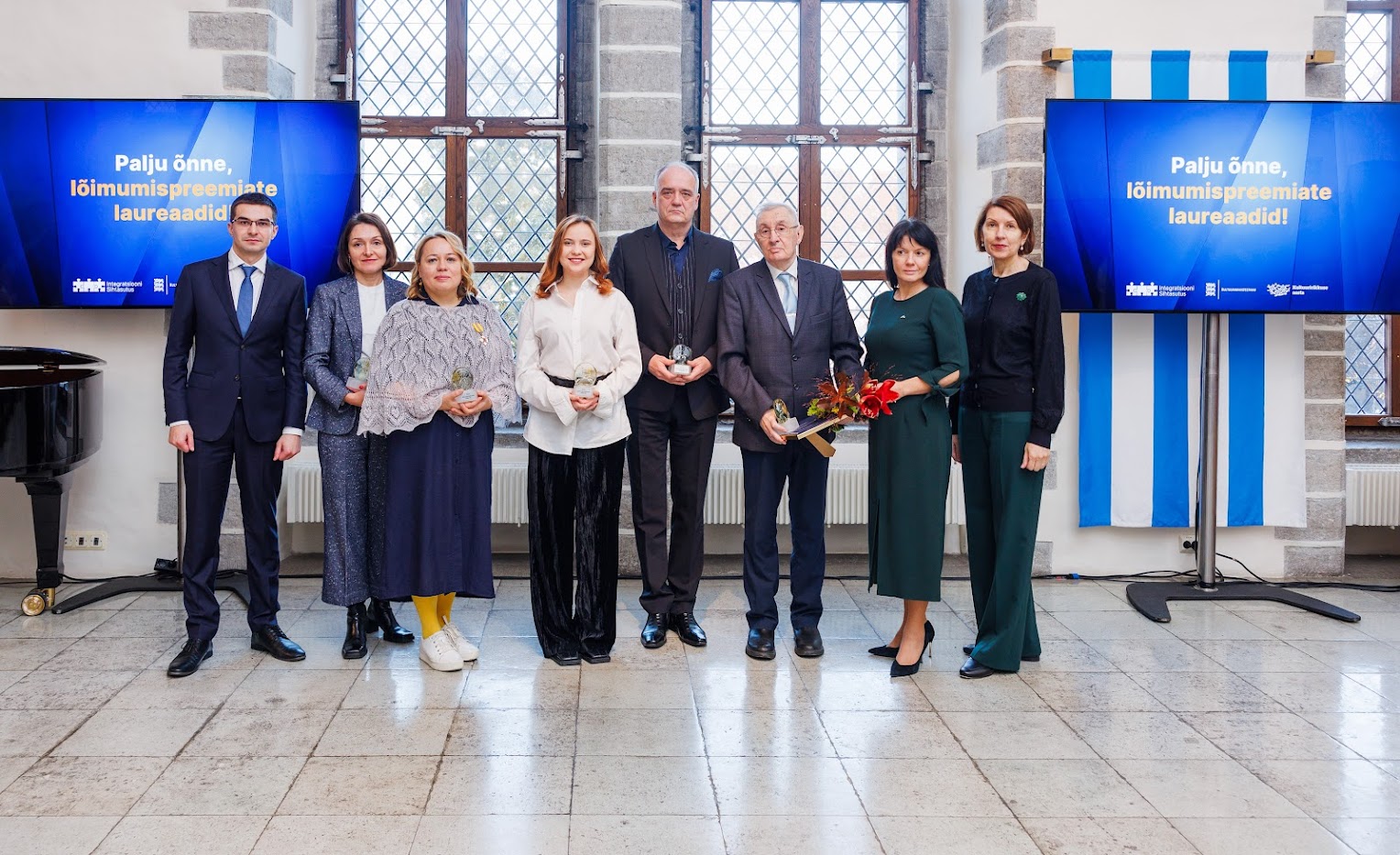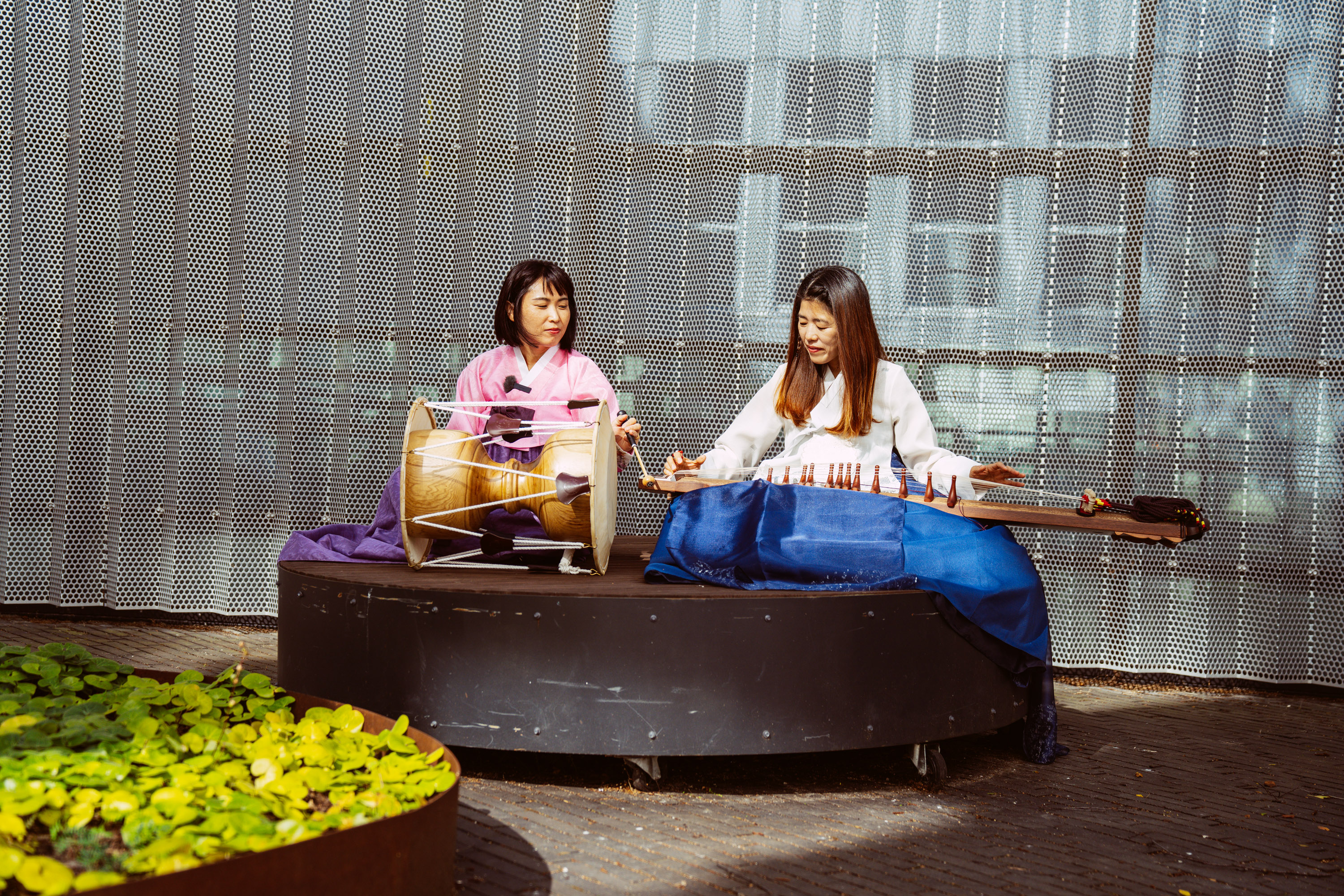Today, on 10 December, the Ministry of Culture and the Integration Foundation announced the winners of the integration awards. The awards for supporting the development of integration were given to choir conductor Hirvo Surva, singer Alika Milova, Anne Suislep, Education Manager at the Foundation of Haapsalu and Läänemaa Museums, Aleksandr Dusman, Head of Ida-Viru Round Table of National Minorities, and the editorial staff of the ETV+ TV channel.
This year, the Integration Foundation and the Ministry of Culture granted awards to people and organisations supporting the development of integration for the twenty-fifth time. In line with the Year of Cultural Diversity, a special prize dedicated to the thematic year was added to the four existing categories.
Minister of Culture Heidy Purga believes that the integration awards are a valuable tradition. ‘Estonia, the country we all share, is diverse and home to different cultures, languages, and traditions. Through integration, we create a more cohesive society where everyone can play a part in shaping our common future,’ said Heidy Purga, recognising the winners of the award.
The winners of the integration awards were selected by a committee of experts of the field from among fifty candidates submitted by Estonian people and organisations in the course of the public competition this year.
The jury awarded the Bridge Builder of the Year title to choirmaster Hirvo Surva, the Spark of the Year title to Estonian singer Alika Milova, the Messenger of the Year title to the editorial staff of ETV+, the Building Blocks of Integration award to Aleksandr Dusman, Head of Ida-Viru Round Table of National Minorities, and the Special Prize of the Year of Cultural Diversity to Anne Suislep, Education Manager at the Foundation of Haapsalu and Läänemaa Museums. In addition to a commendation and a certificate, each winner of the integration prize will also receive a prize of 1,000 euros.
According to Dmitri Moskovtsev, Head of the Integration Foundation, consistent activities and new initiatives are both important in the field of integration. ‘Both the winners and the candidates have valuable experiences and inspiring stories to share and by taking lessons from them, we can build on our work together for a more cohesive society,’ said Dmitri Moskovtsev at the presentation of the integration awards.
All the people and organisations in Estonia will get a new opportunity to submit candidates for the integration award in September next year.
WINNERS OF THE INTEGRATION AWARDS
Bridgebuilder of the Year – HIRVO SURVA
The ‘Bridge Builder of the Year’ category recognises cooperation projects aimed at Estonians and residents with a first language other than Estonian.
As the artistic director of the Estonian Music Council’s spectacular ViruLaul24 music project, Hirvo Surva helped to unite young people from Ida-Viru County in joint cultural activities. Within the framework of the project, a joint choir of students from schools in Ida-Viru County and Tallinn was formed, preparing and performing choral songs together with the Narva City Symphony Orchestra at concerts in Kohtla-Järve, Narva, and Toila dedicated to the Day of Restoration of Independence 2024. Hirvo Surva is the author and organiser of many unifying initiatives, but this year’s ViruLaul24 deeply touched all participants and attendees (including through the media). With this project, he really brought the youth of Ida-Viru County closer to Estonian culture, music, and language, but also Estonian youth to our diverse cultural life.
Spark of the Year – ALIKA MILOVA
The ‘Spark of the Year’ category recognises individuals or organisations for their outstanding work in the field of integration.
Alika Milova is an Estonian singer who has successfully participated in many singing competitions and represented Estonia at Eurovision 2023. Alika is a young, talented, and popular singer who is proud of her Narva and Ida-Viru origins. Supporting Alika brought Estonia together as one united heart in the lead-up to Eurovision. Everybody knows that Alika represented Estonia at Eurovision, but her activities following Eurovision are probably less well known. She takes part in music events and projects that bring together different communities. For example, several collaborative projects with different singers or a concert programme of songs related to the heritage of her ancestors in collaboration with Arno Tamm, which was performed at the Folk Music Festival. With her contagiously bright personality, Alika breaks down preconceptions and sparks inspiration to strive for dreams together.
Messenger of the Year – for the ETV+ PROGRAMME KEELEVESKI
The Messenger of the Year category recognises the promotion of integration through the media.
The TV programme Keeleveski, consisting of twelve episodes, has broadened opportunities for the viewers of ETV+ to explore Estonian language and culture. The series is a wonderful example of how effective it can be to combine educational content with entertainment. With a wealth of examples, comparisons, experiences and suggestions, it has helped to stimulate interest in language learning, support the development of language skills, and break down the myths that hinder language learning. At the same time, meaningful and topical themes have allowed viewers to develop their language skills to a level that is needed for everyday life. The series delivers a powerful message, shared by individuals who have experienced the journey themselves, emphasising belief in a shared linguistic and cultural space in Estonia.
Building Blocks of Integration – ALEKSANDR DUSMAN
The Building Blocks of Integration category recognises raising awareness of Estonia’s cultural diversity and long-term targeted activities promoting integration.
Aleksandr Dusman is the long-standing head of Ida-Viru Round Table of National Minorities, established under the Ministry of Culture. Today, the round table brings together thirty-seven different societies from ten ethnic groups and almost all municipalities in Ida-Viru County. Aleksandr is also the head of the umbrella organisation of national minority cultural societies – Ida-Virumaa Integration Centre – which unites more than thirty national minority cultural societies. Aleksandr celebrated his eightieth birthday this year. He has been working in the field of integration for decades. The list of projects organised under his leadership includes several long-standing traditions, one example being the Loomepada festival. Aleksandr Dusman is a ‘peacekeeper’ for the multi-ethnic community of Ida-Viru County. He has a wonderful ability to keep the regional round table together and to inspire cooperation even in the most difficult of times (e.g. Covid19, during the war in Ukraine), with the ability to compromise and to find solutions for joint action between different ethnic groups. He is also the author and organiser of ten international conferences promoting tolerance and conflict prevention in Ida-Viru County. He has presented Estonian civil society and integration processes at various international conferences, made presentations, and kept the integration needs of the region on the agenda of the central government. Aleksandr is an excellent idea generator, highly conscientious, consistent in his actions, and certainly not one to give up. He is very open to new things, applies new knowledge in his work, and shares it with others.
Special Award for the Cultural Diversity Year – ANNE SUISLEP
The ‘Special Award for the Year of Cultural Diversity’ category recognises valuing and promoting the cultural diversity of Estonia.
Anne Suislep is the Education Manager of Ilon’s Wonderland, operating under the Foundation of Haapsalu and Läänemaa Museums, and the director of the drama class at the Youth Work Centre in Haapsalu. Anne is innovative in her ventures, finds new challenges, and is consistent in her work. She has the ability to motivate the people around her and to do great things for young people and the community in a small county. Anne has done exactly what the Year of Cultural Diversity was set up to do – bring together families from the Haapsalu community with families who have come from elsewhere, demonstrating to both parties the cultural diversity of the community. This gave people a chance to meet other cultures, further enriched by coverage in the local newspaper. The children and the child-friendly environment (Ilon’s Wonderland) made it easier to interact with each other. Listening to the guests revealed that even in a small town, different people and cultural spheres can meet and enrich the local life. As a second initiative, Anne wrote and directed the production Ingerimaale with the Haapsalu Youth Theatre, during which they explored their origins together with young Ingrians and established a connection with their roots.
Photos
Photographs of the winners of the integration awards and the award ceremony at in the Town Hall of Tallinn (Raul Mee):
https://photos.app.goo.gl/i9CNenYh49yv59Ns8


